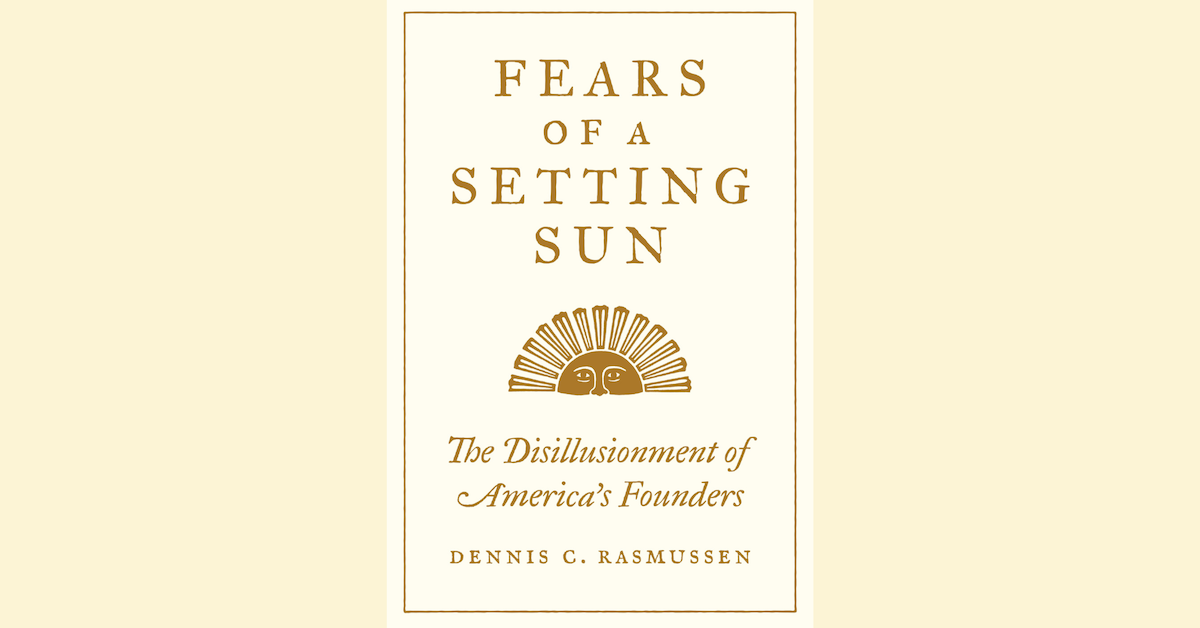Sep 6, 2022 By: yunews

Dennis Rasmussen | Princeton University Press | 2021
Reviewed by Stu Halpern
Fears of a Setting Sun: The Disillusionment of America's Founders by Dennis Rasmussen documents the concerns held by many of the country's earliest leaders about the future of the republic. Inspired by the image on the back of Washington's armchair during the Continental Congress (it depicted a sun—but was it rising or setting?), the professor of political science at Syracuse University offers a surprising but ultimately affirming vision of the reasons behind the founders' discontent. Washington's foremost aspiration, as he expressed multiple times, was that America remain free of political parties and rancorous partisanship. By the end of his life, the first president had already realized his wish would not be granted. Factionalism had taken hold and would never let go. As he wrote to a friend, "I have, for sometime past, viewed the political concerns of the United States with an anxious, and painful eye. They appear to me to be moving by hasty strides to some awful crisis." Alexander Hamilton, in a letter before his death by duel, wrote of how "Every day shews more and more the much to be regretted tendency of Governments intirely [sic] popular to dissolution and disorder." Adams wrote to Jefferson of how their joint cause in forming the country "will be thrown away in the next Generation, upon the Vanity and Foppery of Persons of whom We do not know." Jefferson himself lamented the "evils which the present lowering aspect of our political horison [sic] so ominously portends." It is James Madison, Rasmussen notes, who was "far from desponding." In contrast to the other founders, Madison's letters, writings, and speeches were "suffused with conspicuously optimistic observations about the American regime and its prospects." As the British feminist and abolitionist Harriet Martineau said of Madison, "the finest of his characteristics appeared to me to be his inexhaustible faith—faith that a well-founded Commonwealth may... be immortal... because the principles of justice in which such a Commonwealth originates never die out of the people's heart and mind." For all the toil and trouble of today's politics, Rasmussen notes, the country is infinitely more stable than in the founding era. Gone are slavery and the dispossession and massacres of native tribes, as well as threats of secession and civil war. Basic political and civil liberties have never, in our country's history, been extended to more people. And, unlike in our country's earliest days, we collectively agree that the framework works. "The Constitution is the oldest written charter of national government that remains in effect, " Rasmussen notes, "anywhere in the world, and it has rock solid legitimacy among the American people... And the American form of government has long served as a model, to one degree or another, for other nations around the world." As Rasmussen reassures the reader, the founders, for all of their late-in-life bitterness and disappointment, never stopped devoting themselves to the American republic. They were willing to lay aside their personal ambitions for the nation's sake. Hamilton, as the author notes, had reservations about the Constitution that "ran deeper than almost anyone else's in 1787" but worked harder than almost anyone else to get it ratified. John Adams, having finally become president, was willing to sacrifice his time at the top for a peace deal with France he knew was necessary. As the volume concludes, "The founders' penchant for meeting deep disappointment with steadfast resolve is one that we would do well to emulate in the face of our own political tribulations." To read more Straus Center book reviews, click here. You can learn more about the Straus Center and sign up for our newsletter here. Be sure to also like us on Facebook, follow us on Twitter and Instagram and connect with us on LinkedIn.
